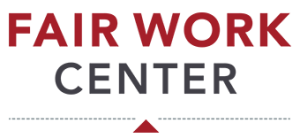Su & Us: Enforcing the minimum wage
 Su, a Korean immigrant who worked as an assistant to a hairdresser in Bellevue, answered phones, greeted customers, swept up hair, and provided tea and snacks. She worked 45 hours per week but was paid just $1,000 per month, less than $5.50 per hour. Her employer thought that she could take advantage of Su and her desire to break into the personal care industry, telling her that she was not an employee but an “independent contractor.”
Su, a Korean immigrant who worked as an assistant to a hairdresser in Bellevue, answered phones, greeted customers, swept up hair, and provided tea and snacks. She worked 45 hours per week but was paid just $1,000 per month, less than $5.50 per hour. Her employer thought that she could take advantage of Su and her desire to break into the personal care industry, telling her that she was not an employee but an “independent contractor.”
Su knew this was unfair and was referred to the Fair Work Legal Clinic by 21 Progress, one of our Fair Work Collaborative partners. The Legal Clinic represented Su, filing a charge of wage theft on her behalf with Washington’s Department of Labor and Industries (L&I).
L&I initially found that Su’s employer must pay $2,000. But Su brought in her records showing that she was actually owed double that amount. L&I agreed and ordered Su’s employer to pay the full $4,000 she was owed. Su is thrilled with the result and we are thrilled that we could support Su in standing up for her right to a fair wage. That said, L&I could and should have gone further in cases like Su’s.
Unfortunately, in the majority of its cases, L&I does not require that employers pay interest when paying back wages stolen from their workers’ paychecks. This means that if L&I orders payment a year after the theft happened, the employer gets to use the worker’s money during that whole time. This is like an employer taking an interest-free loan from its employees’ paychecks. Meanwhile, low-wage workers – who are disproportionately women, people of color, immigrants and refugees – have the pay the interest on credit card debt or payday loans just to get by. This isn’t right, and Fair Work Center will continue to advocate that L&I must include interest in these wage and hour cases.
If you think you are not being paid the minimum wage, or what you are owed, please call our hotline at 1-844-485-1195, email us at help@fairworkcenter.org, or fill out our our web-form.
